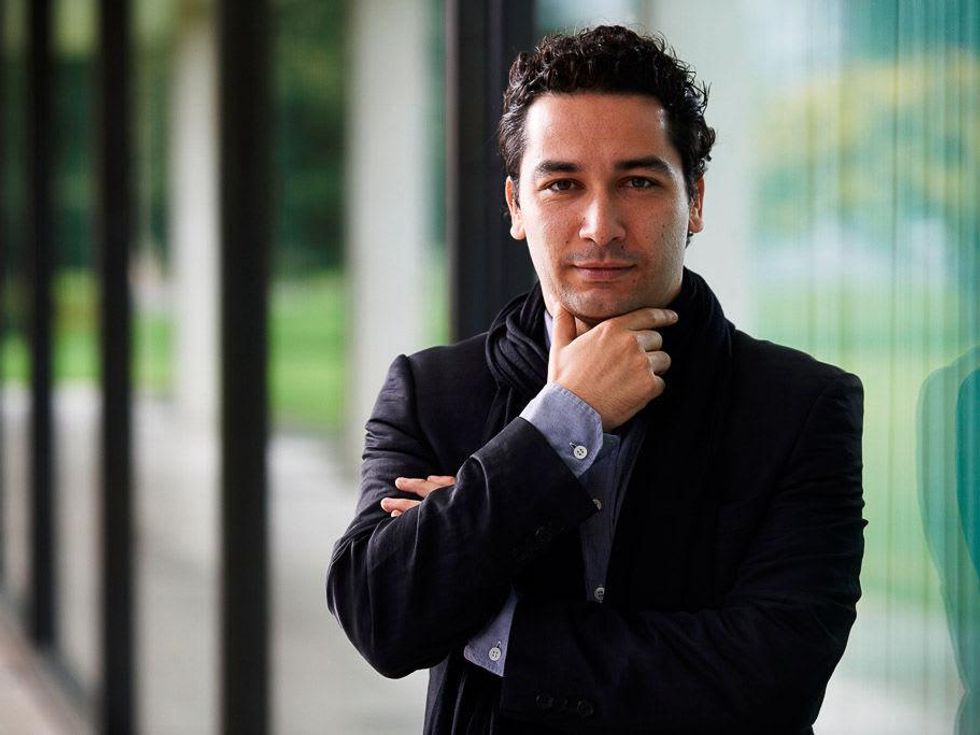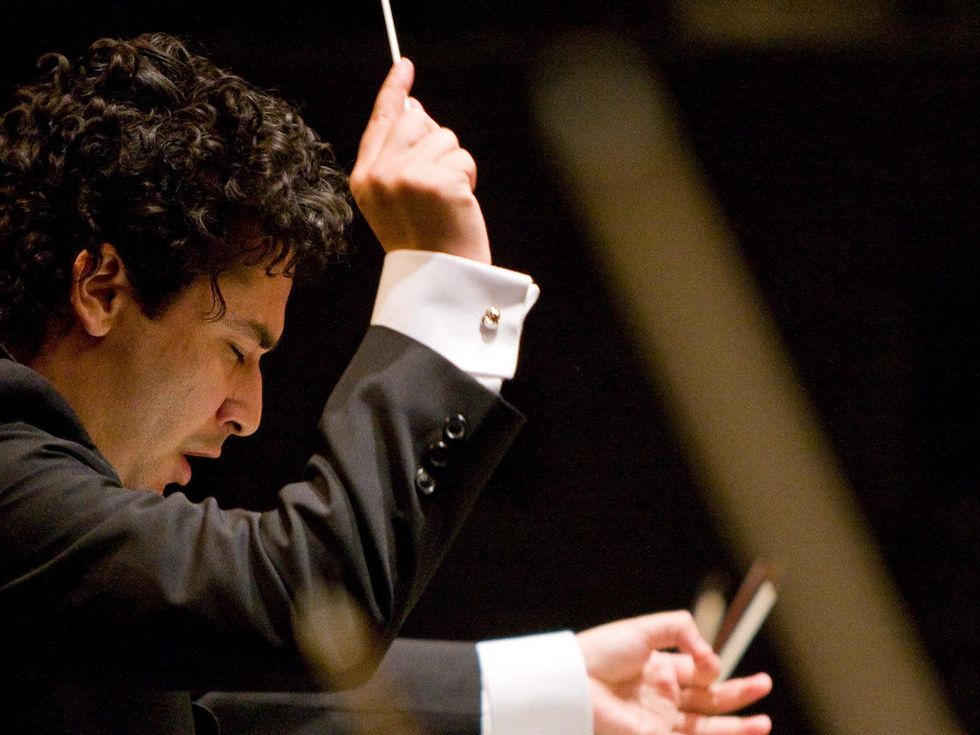The search is over
Houston Symphony names new conductor after secret rehearsal: Hans Graf's replacement is . . .
Think of the Houston Symphony's search for a new maestro a tad like a season of the Bachelorette.
Many attractive suitors step on her podium, wave their baton, make beautiful music and wonder if there is a genuine love connection between the many moving parts that make this $28-million nonprofit group sing. After all, by admission of current music director Hans Graf, who's set to retire in May after a 12-year tenure, the post has become more involved and complicated over the years.
Andrés Orozco-Estrada, would you accept this rose?
His answer was yes. Cue music.
It was love at first note between the young 35-year-old, Colombian-born violinist/conductor and the orchestra musicians at his Houston debut in October when he led an informal ACCESS concert as well as traditional performances of Richard Strauss' Horn Concert No. 1, with William VerMeulen as the featured soloist, and Berlioz's Roman Carnival Overture and Symphonie Fantastique.
For those who believe that a change in conductors only brings about nuances perceptible to the classically trained ear, this performance dispelled that myth faster than the roll of the protagonist's decapitated head as depicted in the latter Berlioz masterpiece. In fact, it was in the balance of technical precision atop of the impromptu interpretative extremes that elevated the Houston Symphony's energy and emotional bravura.
The genuine charm of his disposition, on and off stage, added to this non-verbal bond.
"The orchestra musicians were looking for two things at the same time," Brinton Averil Smith, principal cellist, says. "A conductor who can fix things, someone who could get us to play more together and provide structure, but at the same time, we want to be able to let loose and be inspired to change things in the moment.
"When he worked on the finer details, when he asked you to do something, I found myself smiling."
"That's real music making — and it's rare to find a conductor that can achieve both."
Smith, who's delighted to see this five year demanding process come to a conclusion, describes this duality as alchemy, a melange of earned trust and charisma. He compares Orozco-Estrada's zest to that of Gustavo Dudamel, but with a Central European flair.
Orozco-Estrada's prowess comes in his expressive body language, a physical gift that communicates effectively. Not out of control like others who look like an inflatable Gumby, others whose gestures lack explicit meaning.
"It's funny," Smith says. "At first we are skeptical of new conductors. We size each other up; we wonder how things are going to work. Andrés was very charming and funny, but there was more to him than jokes and laughs. When he worked on the finer details, when he asked you to do something, I found myself smiling — instead of feeling like a slave in a galley ship."
Smiling. That's not something to be taken for granted as low morale is a common problem plaguing professional symphony orchestras at large, particularly during challenging economic times when many nonprofits find it difficult to raise the necessary funds to keep financial statements in the black.
A Secret Meeting
The synergies of that concert run roused the orchestra to request a closed-door rehearsal to further appraise the comparability of his aesthetic and their style, as first impressions can be deceiving. Not in this case.
"From the moment he made his debut with us in October, there was an instantaneous chemistry that we hadn't yet felt or seen between a conductor and an orchestra," Houston Symphony executive director and CEO Mark Hanson tells CultureMap. "When we were able to find a two-day period a couple of weeks later for additional meetings and the secret rehearsal, we seized the opportunity even though it was unorthodox, and in some people's minds, crazy."
Orozco-Estrada's visit in November — which comprised his core repertoire, including movements of Brahms' Symphony No. 1, Rachmaninoff's Symphonic Dances and Beethoven's Symphony No. 5 — left the orchestra players wanting more, a feeling they hope subscribers and casual guests of the Houston Symphony experience embedded in the music making.
"From the moment he made his debut with us in October, there was an instantaneous chemistry that we hadn't yet felt or seen between a conductor and an orchestra."
"We had members of the board, staff and orchestra in the search committee," Houston Symphony board president Robert A. Peiser says. "Working together was remarkably important. The musicians were very much a part of this process, because it's important that they like the music conductor.
"They aren't an easy group to please. They have diverse opinions. The process brought us a lot closer together, and that will have lasting benefits."
The 12-member search committee, chaired by Justice Brett Busby, knew this rose ceremony couldn't wait. The terms of the contract were finalized early last week, and Andrés Orozco-Estrada arrived in Houston Monday evening.
"When you meet someone with credible chemistry with musicians and non-musicians, especially after considering 50 other conductors, we knew he was the right choice," Peiser says. "We had good thoughts about other conductors, but none to the extent that we had about Andrés."
First Hispanic maestro
Orozco-Estada's appointment as music director designate, underwritten by the Roy and Lillie Cullen endowed chair, makes him the first Hispanic to hold the post in the orchestra's 99 year history, and one of the youngest. Julien Paul Blitz, the ensemble's first maestro, was 28 years old in 1931, and Larry Foster was 30 years old in 1971 when they respectively signed on for the job.
Among the other potential candidates for the job were Hannu Lintu, Christoph Koenig, John Storgårds, Pablo Heras-Casado, Juanjo Mena, Thomas Dausgaard, Gilbert Varga and Carlos Kalmar.
Orozco-Estrada's five-year contract, which begins with the 2014-15 season, was formally announced by Peiser and Hanson on the stage of Jones Hall Wednesday in the company of the musicians, staff, board and major stakeholders of the city, including Mayor Annise Parker. The celebratory event was streamed live.
"Houston is a city filled with dynamic, talented, hard-working and optimistic people," Parker said. "I congratulate the Houston Symphony for finding a music director who shares those traits and whose personal story fits right into our widely diverse and international community."
"The musicians were very much a part of this process, because it's important that they like the music conductor. They aren't an easy group to please; and they have diverse opinions."
Orozco-Estrada is the type of fearless individual who has no qualms about uprooting his life, moving to a new world and making things happen. Without speaking a word of German, he traveled to Vienna when he was 19 years old to pursue his education. There, he fine tuned his skills at the Vienna Music Academy under the tutelage of Uroš Lajovic, whose musical lineage includes giants like Hans Swarowsky, Richard Strauss, Arnold Schoenberg and Anton Webern.
What's distinctive about Orozco-Estrada, on top of having a sexy, hyphenated name that both hint and dim his foreign provenance (let's not dismiss that benefit for marketing departments) is that he's lived the immigrant story so essential to appreciating Houston's ethos. His South American heritage speaks to a rapid demographic shift; and his European artistic pedigree appeases those needing a dose of Western authenticity in the leader of an art form that stems from Germany, France and Italy.
"This country has changed a lot in the last 10 to 20 years," Peiser says. "We've gone from a culture that has an elitist attitude in some areas to one that's much more inclusive. This institution has been changing and needs to continue to change along with the environment that it operates in.
"With Andrés we are looking to accelerate this change."
Renewed energy
Alongside his wife Julia and daughter Laura, Orozco-Estrada will keep a residence in Houston and in Austria, where he is also the music director of the Tonkünstler Orchestra. He will bow out of his post as the principal conductor of the Basque National Orchestra in San Sebastian, Spain.
To inaugurate the centennial season of the Houston Symphony, he will conduct 13 concerts during four weekends.
"On the surface, what people are going to notice more than anything is a youthful exuberance and spirit of optimism that is going to be present whenever he's on the podium — a contagious enthusiasm for what he's doing," Hanson says. "His presence is going to add that extra spark that we haven't had in previous music directors."
While it's true that Orozco-Estrada is a newcomer to Houston, part of the city's allure is that it welcomes strangers as friends and neighbors as family.



 The menu includes caviar, hot dogs, and taquitos.Photo by Julie Soefer
The menu includes caviar, hot dogs, and taquitos.Photo by Julie Soefer